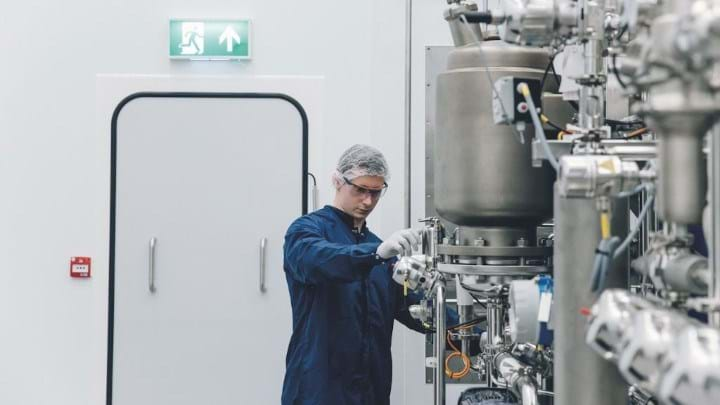UK Government invests £100m to accelerate Covid-19 vaccine manufacture

THE UK Government has announced a £100m (US$127.7m) investment to fund a state-of-the-art facility that will accelerate at scale, UK production of any successful Covid-19 vaccine. The investment offers a “substantial boost” to the UK’s vaccine manufacture capability, according to the Government.
The Cell and Gene Therapy Catapult Manufacturing Innovation Centre, developed with Innovate UK and Cell and Gene Therapy Catapult, will have the capacity to produce millions of doses per month. Innovate UK is part of UK Research and Innovation, which funds national research and innovation, while the Cell and Gene Therapy Catapult (CGT Catapult), supported by Innovate UK, aims to build a world-leading cell and gene therapy sector in the UK.
The Centre will be achieved by upgrading an existing facility in Braintree, Essex, UK, to create a fully-licensed manufacturing centre. The facility is owned by Benchmark Vaccines, a contract manufacturing company focussed on animal health vaccines, and part of Benchmark Holdings.
CGT Catapult has agreed to purchase the business and assets comprising the manufacturing facility for £16m as part of the UK response to Covid-19. According to The Guardian, the total £100m investment includes the costs for purchase and conversion of the Braintree site.
The 75 highly-qualified staff members already employed at Braintree will transfer to CGT Catapult once the sale is complete. An expected date for completion was not given. According to Benchmark, the Braintree facility and team have a wide range of GMP-accredited capabilities including antigen production, formulation, process development and scale manufacturing and can be rapidly repurposed to produce human vaccines. GMP (good manufacturing practice) is the minimum standard that medicine manufacturers must meet in their production processes.
According to the Government, the new Centre will ensure that the UK is capable of manufacturing vaccines and advanced medicines, including for emerging diseases, far into the future. Scientists and researchers based in the centre will work to accelerate the delivery of new treatments to patients by developing cutting-edge therapies to treat life-changing diseases, such as diabetes, heart disease, and cancer.
The Centre – due to open in December 2021 – will also create new, highly-skilled jobs to fuel the UK’s economic recovery. The Centre is expected to be at the forefront of the UK cell and gene therapy industry. It is predicted that employment in the sector will reach more than 6,000 jobs by 2024, with more than 3,000 in manufacturing and bioprocessing.
The Government also announced a £4.7m investment to support enhanced vaccine manufacturing capabilities. This is intended to allow the CGT Catapult to ensure the country has the best skills and expertise by developing virtual and physical national Centres for Advanced Therapies Training and Skills, in partnership with industry.
The facilities and online training platform will provide industry-standard skills and experience in advanced gene therapy and vaccine manufacturing, including sterile techniques for GMP.
Alok Sharma, Secretary of State for Business, Energy and Industrial Strategy, said: “We are taking all necessary steps to ensure we can vaccinate the public as soon as a successful Covid-19 vaccine becomes available.
“This new Cell and Gene Therapy Catapult Manufacturing Innovation Centre, alongside crucial investment in skills, will support our efforts to rapidly produce millions of doses of a coronavirus vaccine while ensuring the UK can respond quickly to potential future pandemics.”
Kate Bingham, Chair of the Vaccines Taskforce, commented that the acquisition of the new Centre will help to vaccinate high-risk populations at the earliest opportunity. Vaccines Taskforce was established by the UK Government to lead the country’s efforts to find and manufacture a Covid-19 vaccine.
Matthew Durdy, CEO, CGT Catapult commented: “This commitment from government through the Vaccines Taskforce will enable continued growth and productivity in the cell and gene therapy sector, as well as providing vital resource for vaccine manufacturing and economic recovery from the Covid-19 pandemic.
“We are delighted to be able to deploy the specialist capabilities of the Cell and Gene Therapy Catapult in such an important initiative. Accelerating the availability of Covid-19 vaccines, increasing skills and employment, and facilitating growth of the advanced medicines industry will make a valuable contribution to the recovery of the economy.”
The new Centre will complement the Vaccines Manufacturing and Innovation Centre (VMIC) which also received funding from the Government. Currently under construction in Oxfordshire, UK, VMIC is the country’s first strategic vaccine development and advanced manufacturing facility. Once completed it is expected to have the capacity to produce enough vaccine to serve the entire UK population.
Initially, VMIC was awarded £93m by the UK Government, and then received a further £38m to establish a rapid deployment facility (opening later this summer) to support efforts to ensure that a successful vaccine is widely available to the public as quickly as possible. Completion of the VMIC is expected next year.
The Government says that the country is at the forefront of international efforts to research and develop a Covid-19 vaccine. It has provided £131m in funding to the country’s University of Oxford and Imperial College London to accelerate two vaccine candidates.
Additionally, the announcement about the new Centre – which came on 23 July – followed another on 20 July about the Government securing early access to 90m doses of coronavirus vaccine candidates from a BioNTech/Pfizer alliance and Valneva. This was as part of the UK’s strategy to build a portfolio of promising vaccines to protect the UK population from Covid-19. Meanwhile, treatments containing Covid-19-neutralising antibodies have been secured from AstraZeneca to protect those who cannot receive vaccines, such as cancer and immunocompromised patients.
Recent Editions
Catch up on the latest news, views and jobs from The Chemical Engineer. Below are the four latest issues. View a wider selection of the archive from within the Magazine section of this site.




